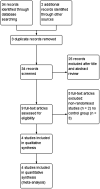Sorafenib in the treatment of patients with hepatocellular carcinoma (HCC) and microvascular infiltration: a systematic review and meta-analysis
- PMID: 32815430
- PMCID: PMC7444130
- DOI: 10.1177/0300060520946872
Sorafenib in the treatment of patients with hepatocellular carcinoma (HCC) and microvascular infiltration: a systematic review and meta-analysis
Abstract
Objective: Microvascular invasion is shown to be an independent risk factor for liver cancer recurrence. Timely treatment may reduce the recurrence rate and prolong total survival time. The aim of this study was to investigate the effectiveness of sorafenib in treating patients with hepatocellular carcinoma (HCC) and microvascular invasion.
Methods: A comprehensive literature search was conducted in PubMed, EMBASE, MEDLINE, web of science and Cochrane Library databases for articles published up to December 2019. Two researchers independently reviewed and cross-checked independent reports with sufficient information. A meta-analysis was conducted to assess the impact of sorafenib on mortality in patients with HCC and microvascular involvement.
Results: Four studies were included in the qualitative and quantitative analyses, comprising 955 cancer events and 505 cancer deaths. Meta-analyses showed that sorafenib treatment was associated with an improved survival rate versus no sorafenib treatment in patients with HCC and microvascular invasion (relative risk 1.369, 95% confidence interval 1.193, 1.570).
Conclusions: Sorafenib treatment may improve survival in patients with HCC and microvascular invasion. However, due to the potential for residual confounding, the results should be interpreted with caution.
Keywords: Sorafenib; hepatocellular carcinoma (HCC); microvascular invasion (MVI).
Figures




Similar articles
-
Microvascular Invasion as a Predictor of Response to Treatment with Sorafenib and Transarterial Chemoembolization for Recurrent Intermediate-Stage Hepatocellular Carcinoma.Radiology. 2019 Jul;292(1):237-247. doi: 10.1148/radiol.2019181818. Epub 2019 May 28. Radiology. 2019. PMID: 31135299
-
A meta-analysis of the efficacy and safety of adjuvant sorafenib for hepatocellular carcinoma after resection.World J Surg Oncol. 2021 Jun 10;19(1):168. doi: 10.1186/s12957-021-02280-9. World J Surg Oncol. 2021. PMID: 34112190 Free PMC article. Review.
-
Comparison of different adjuvant therapy regimen efficacies in patients with high risk of recurrence after radical resection of hepatocellular carcinoma.J Cancer Res Clin Oncol. 2023 Sep;149(12):10505-10518. doi: 10.1007/s00432-023-04874-0. Epub 2023 Jun 7. J Cancer Res Clin Oncol. 2023. PMID: 37284841 Review.
-
Sorafenib versus hepatic arterial infusion chemotherapy for advanced hepatocellular carcinoma: a systematic review and meta-analysis.Jpn J Clin Oncol. 2019 Sep 1;49(9):845-855. doi: 10.1093/jjco/hyz069. Jpn J Clin Oncol. 2019. PMID: 31063184
-
Role of Sorafenib in Patients With Recurrent Hepatocellular Carcinoma After Liver Transplantation.Prog Transplant. 2016 Dec;26(4):348-355. doi: 10.1177/1526924816664083. Epub 2016 Sep 20. Prog Transplant. 2016. PMID: 27555074
Cited by
-
The Prognostic Value of Neutrophil-to-Lymphocyte Ratio and Platelet-to-Lymphocyte Ratio in Patients with Hepatocellular Carcinoma Receiving Atezolizumab Plus Bevacizumab.Cancers (Basel). 2022 Jan 11;14(2):343. doi: 10.3390/cancers14020343. Cancers (Basel). 2022. PMID: 35053508 Free PMC article.
-
Single-cell RNA sequencing reveals intratumoral heterogeneity and multicellular community in primary hepatocellular carcinoma underlying microvascular invasion.Heliyon. 2024 Aug 31;10(18):e37233. doi: 10.1016/j.heliyon.2024.e37233. eCollection 2024 Sep 30. Heliyon. 2024. PMID: 39309949 Free PMC article.
-
Postoperative adjuvant therapy for hepatocellular carcinoma with microvascular invasion.World J Gastrointest Surg. 2023 Jan 27;15(1):19-31. doi: 10.4240/wjgs.v15.i1.19. World J Gastrointest Surg. 2023. PMID: 36741072 Free PMC article. Review.
-
Microvascular Invasion in Hepatocellular Carcinoma: A Review of Its Definition, Clinical Significance, and Comprehensive Management.J Oncol. 2022 Mar 30;2022:9567041. doi: 10.1155/2022/9567041. eCollection 2022. J Oncol. 2022. PMID: 35401743 Free PMC article. Review.
-
First-Line Systemic Treatment Strategies for Unresectable Hepatocellular Carcinoma: A Systematic Review and Network Meta-Analysis of Randomized Clinical Trials.Front Oncol. 2021 Dec 24;11:771045. doi: 10.3389/fonc.2021.771045. eCollection 2021. Front Oncol. 2021. PMID: 35004289 Free PMC article.
References
-
- Ferlay J, Shin HR, Bray F, et al. Estimates of worldwide burden of cancer in 2008: GLOBOCAN 2008. Int J Cancer 2010; 127: 2893–2917. - PubMed
-
- Llovet JM, Burroughs A, Bruix J. Hepatocellular carcinoma. Lancet 2003; 362: 1907–1917. - PubMed
-
- Onoe T, Yamaguchi M, Irei T, et al. Feasibility and efficacy of repeat laparoscopic liver resection for recurrent hepatocellular carcinoma. Surg Endosc Epub ahead of print 18 December 2019. DOI: 10.1007/s00464-019-07246-3. - PubMed
Publication types
MeSH terms
Substances
LinkOut - more resources
Full Text Sources
Medical

